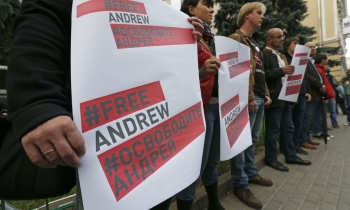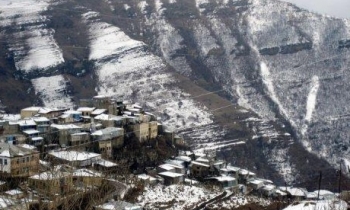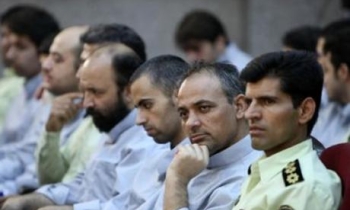Two French Muslim organisations are suing magazine Charlie Hebdo for printing cartoons satirising the prophet Mohammed. The trial began in Paris today in a civil lawsuit by the Grand Mosque of Paris and the Union of Islamic Organisations of France.

The magazine has been accused of deliberately trying to hurt Muslims “in their collective attachment to their beliefs” by publishing cartoons of the prophet in a special issue a year ago. Most of the cartoons were the ones which the Danish newspaper Jyllands-Posten published in September 2005, sparking protests in many Muslim countries. The front page one was by French cartoonist Jean ‘Cabu’ Cabut.
Politicians, intellectuals, secular Muslims and left-wing pressure groups have lined up behind Charlie Hebdo, arguing that Muslim groups have no right to call for limits on free speech
“We support Charlie Hebdo in its commitment to free expression and to the right to satire and we condemn the many different kinds of intimidation that have been targeted at this weekly,” Reporters sans Frontières (RSF) said. “The public area must remain open not only to dialogue but also to controversy.”
"I just cannot imagine the consequences not only for France but for Denmark and Europe if they lose the case," Fleming Rose, the Danish editor who first published the cartoons said. "It would turn back the clock decades, ages."
A group of French academics, including some Muslims, published an open letter in the magazine Liberation on Monday, according to BBC. "Democrats the world over and especially Muslims hope to see in Europe, and above all in France, a secular haven where their words are not blocked by dictators or fundamentalists. If Charlie Hebdo were to be convicted ... we would all lose this shared space of resistance and liberty," the letter said.
Charlie Hebdo’s decision to reprint the Danish cartoons was taken at an especially fraught moment. Some 10 news media had been banned or suspended in countries such as Morocco, Saudi Arabia and Indonesia for reproducing the cartoons. Journalists have been arrested in countries such as Jordan, Algeria and Yemen.
“By publishing the cartoons, Charlie Hebdo chose to resist the attempt to impose silence by means of threats,” RSF said in a statement. “This is what counts. The public arena must remain free.” The organisation continued: “The trial is a test of freedom of expression in France. We express our unconditional support for Charlie Hebdo in its fight for the right to satire and we hope that the courts will protect this principle, as the Danish judges did on October 26, 2006 when they acquitted Jyllands-Posten’s editors and ruled that its Mohammed cartoons were not offensive to Muslims.”

The decision of Charlie Hebdo to publish the cartoons "was part of a considered plan of provocation aimed against the Islamic community in its most intimate faith," the Union of French Islamic Organisations and the Paris Grand Mosque have alleged. It was "born out of a simplistic Islamophobia as well as purely commercial interests".
"This is a case that goes way beyond just freedom of expression," Charlie Hebdo's lawyer, Richard Malka, said, according to a Bloomberg News report. "It puts into question the Republic and the whole notion of secular society." A lawyer for the Paris Mosque, Francis Szpiner, however, argued that the cartoons aren't covered by freedom of speech. "Racism is not an opinion," he said. "It's abuse and it's a crime."
A televised debate between Charlie Hebdo publisher Val and Paris Grand Mosque rector Dalil Boubakeur broke down in acrimony after they squabbled over the boundaries of free speech, a Reuters report said.
"Democracy works by criticising ideologies, including religious ideologies. If we can't criticise religion anymore, there will be no women's rights, no birth control and no gay rights," Val said in the raucous TV debate, according to Reuters. Boubakeur said the controversial cartoon showing Mohammad with a bomb in his turban was not simply satire, but an insult against all Muslims by suggesting they were all terrorists.
Muslims make up between 3-10 per cent of France's 61 million inhabitants, according to various studies. France doesn't allow official statistics on race and religion. Catholics make up between 60- 80 per cent of the population, although only a minority practices the religion, polls show, the Bloomberg report said.
Ever since the cartoons first appeared in Jyllands-Posten, there has been a never-ending debate as to whether it is permissible to publish opinion pieces or cartoons that could offend the religious sensibilities of part of the population. After the publication of Robert Redeker’s op-ed piece in Le Figaro last September, French courts are now having to take a position on this issue. “We expect an outcome that accords with the principles of free expression and the freedom to inform and be informed,” RSF said.
In the trial, the plaintiffs are requesting 30,000 euros in damages and the publication of key passages from the court’s ruling. Charlie Hebdo published its special issue on the cartoons one week after they were published by the French daily France Soir on February 1, 2006, in a decision that led to the dismissal of its Soir’s editor, Jacques Lefranc by Raymond Lakah, the newspaper's French-Egyptian owner.
Courts in France, which observes a strict separation of church and state in the public sphere, have repeatedly defended free speech rights against religious objections. The Catholic church failed in recent years to win court injunctions against a film poster with a cross formed like a swastika and a fashion ad with scantily clad women posing like Jesus and his Apostles in Da Vinci's painting The Last Supper.









